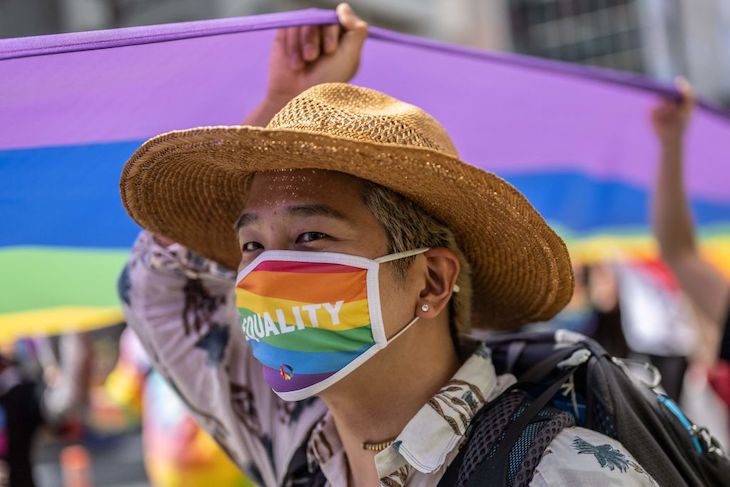Want to avoid Pride month? Bit tired of the, almost literally, in your face, carnival of uninhibited sexual freedom we see on our streets throughout June? Then come to Japan. It’s not that Pride doesn’t happen here at all, just that the Japanese for various cultural and historic reasons, don’t make a song and dance – or a borderline street cabaret – out of it.
Japan’s version ‘Rainbow Pride’ is held in April and lasts just two days. It was back on this year for the first time since 2019 and was apparently reasonably well-attended. I say ‘apparently’ because I saw no sign of it, nor watched or read a single report in the media. It was, to use an old-fashioned term, discreet.
But for how much longer? Sexual politics, so long not much of an issue here, is threatening to become as shrill and contentious as in the UK and US. Last week, the diet (parliament) passed a bill supposedly aimed at promoting understanding of LGBTQ people, but watered down to virtual nothingness. It provoked campaigners on to the street in small, and occasionally not so small gatherings: 1,600 gathered outside the diet in Tokyo.
Sexual politics is threatening to become as shrill and contentious as in the UK
The crux of the matter is a couple of tweaks that were made to the wording. Originally the bill promised to outlaw all discrimination but that was changed to ‘unfair discrimination’. Campaigners allege this leaves room for a bit of fair discrimination from time to time. And a last-minute caveat was inserted to the effect that the legislation should be implemented as far as citizens felt ‘at ease’ with it, suggesting that if one person feels a little uneasy, it won’t be. The bill did not stipulate any penalties for those discriminating against LGBGTQ people. Ken Suzuki, a law professor at Meiji university, said the revised law ‘…has no meaning at all.’
Campaigners will have found their disappointment compounding the frustration they already feel at the lack of progress towards the full recognition of same-sex marriage (Japan is the only G7 country where it is not fully sanctioned). Various courts in Japan have reached different conclusions on whether same-sex marriage violates the constitution. The latest, in Fukuoka, ruled that a ban was ‘in a state of constitutionality’ an opaque term of art that stops short of the precious ‘unconstitutional’ verdict that might mandate change.
The orthodox explanation for all this foot dragging is that Japan is a backward gerontocracy that needs to move into the 21st century pronto. There is some evidence for this: an executive secretary to prime minister Fumio Kishida said he wouldn’t want to live next to a gay couple, or even look at them, for which he was promptly sacked. There is also anecdotal evidence of gay couples having difficulty finding landlords, who tend to be older men, who will let their properties to them.
On the other hand, there is no history of anti-gay discrimination in Japan, no religious basis for prejudice and considerable evidence that same sex relationships were embedded in the culture as far back as anyone can tell. Homosexual acts were only banned for a short period in the 19th century and the prevailing view throughout history seemed to be that people could do what they wanted in private, as long as it didn’t scare the horses. Tellingly, there are no pejoratives words for sexual minorities in the Japanese language.
Why then the reluctance to go all the way and have a full Pride month and fully equal marriage? The deeper motivation of the lawmakers is likely to be prudence. There is some concern here that Japan could go the way of the West and witness a never-ending series of culture war skirmishes – gay liberation followed by trans liberation, and who knows what next? Where would it all lead? Fumio Kishida, one of Japan’s more left-leaning leaders is opposed to gay marriage. He has said redefining marriage would change Japan for good – not the good.
This innate caution has probably been reinforced by the fact that rather a lot of the impetus for change is coming from external sources. US ambassador to Japan Rahm Emanuel has raised eyebrows with his persistent tweeting on the subject. An article scolding Japan for its backwardness in Japan Today, written by a California professor of cultural studies, is typical of the reportage. Many at the protests were westerners.
These voices often cite polling on gay marriage, which appears to show a clear majority in favour. But in a country where giving polite answers to difficult questions is an article of faith, it’s unclear how seriously this can be taken as evidence of an urgent desire for change. It certainly hasn’t stopped people voting for the conservative LDP.
Japan is likely to remain a low-key Pride region for a while yet. The idea doesn’t really translate. After all, celebrating publicly and ostentatiously one’s own innate characteristics is profoundly un-Japanese. Members of sexual minorities in Japan might be somewhat closeted, but then so is everyone else, concealing their own distinctive attributes, personality, and views, in the interests of maintaining the delicate harmony of society, the treasured and inviolable ‘wa’. It’s the little burden everyone must shoulder to foster a sense of shared struggle and shared purpose.







Comments